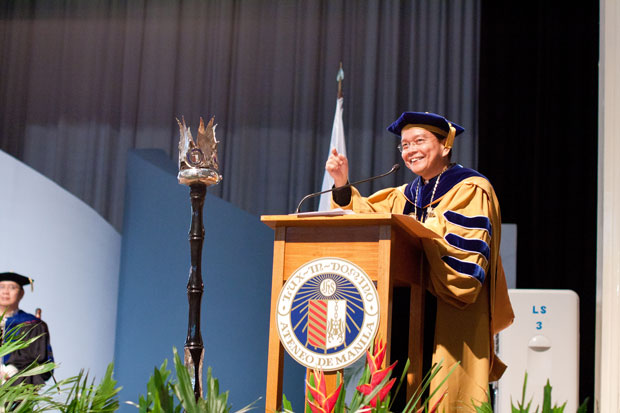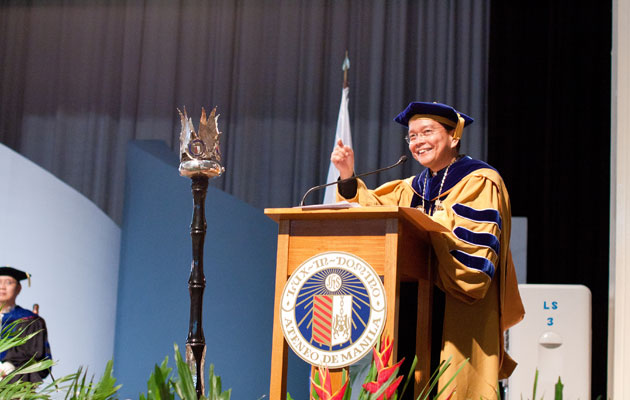
“Bagong Simula.” The Ateneo de Manila University enters a new era as Fr. Jose Ramon Villarin, SJ formally assumes the position of 30th university president. Photo by Mawi T. Dagdag
FORMALLY ASSUMING office as the 30th president of the Ateneo de Manila University, Fr. Jose Ramon Villarin, SJ plans to set the school along a more proactive route in its social involvement beyond Loyola Heights.
Villarin took his oath last September 8 during the investiture ceremonies held at the Henry Lee Irwin Theater. The event was graced by top school officials, members of the Society of Jesus, and government dignitaries, including Philippine President Benigno Aquino III, who administered the oath.
The new president discussed his plans for the Ateneo during his inaugural address. Hinged on interiority, development and stewardship, Villarin’s three main areas of concern are resonating with student leaders in the university.
In a memo dated August 25, Villarin introduced the University Strategic Planning Process (USPP), an operation geared towards “charting directions for the future.” This will translate into the University Strategic Plan 2011-2017.
Three strategic concerns
In a report he presented to the Board of Trustees last August 6, Villarin highlighted three strategic priority areas in charting his plans for the university. He identified these as identity and mission, nation building, and environment and development.
He said that while there was “no doubt” about the school’s continuing adherence to excellence, there is a need to ask about the force behind this drive.
“What or who is this excellence for? This question strikes at the heart of who we are and what we do,” he said.
In an interview with The GUIDON, Villarin added, “People need to know where they are in the institution, where and how they belong.”
Early on in his term, Villarin also expressed his desire in continuing what his predecessor Fr. Bienvenido Nebres, SJ has previously done, particularly in the aspect of nation building.
“Proceeding from its identity and mission, the Ateneo de Manila cannot insulate or disengage itself from the ‘crucial struggle of our time: the struggle for faith and that struggle for justice which it includes,’” his report read.
Villarin acknowledged that since there are many aspects to nation building, there is a need to define what it means for the Ateneo.
He believes that the university, as an educational institution, can play three roles in nation building: as change catalysts, as strategic thinkers, and as culture shapers.
“A catalyst is not part of the main actors. A catalyst, by its presence, makes things happen,” Villarin said.
Villarin also believes that shaping culture plays a part in building the nation. “If you want to build this nation, you have to promote or deepen love for country. You cannot build what you do not love.”
Villarin’s third priority, which concerns environment and development, includes his specific plans for the school campus. While environment and development may sometimes seem to be polar opposites, Villarin believes that both can be made to work with each other. His plans for the campus involve waste management, flooding concerns and campus traffic.
Action plans
To put his plans into action, Villarin has created agenda committees for each strategic concern. Each is expected to review the current status of the university in relation to each point, to propose specific goals, and eventually to advise the president on possible strategies.
The chairs are Ma. Assunta Cuyegkeng for environment and development, Antonio La Viña for nation building, and Anthony Ceasar Pabayo, SJ for mission and identity. The three are working under the USPP Executive Committee led by Karel San Juan, SJ.
“The agenda committees are now in the process of consulting all units and stakeholders as far as possible,” Villarin said in the memo. After the consolidation of data, the results will be presented on October 13 to 15 during the University Strategic Planning Workshop.
“I hope students can help us with the three concerns, especially [with] the first: mission and identity. It’s important [that you know] who you are. If you have a strong sense of who you are, the rest will follow,” Villarin said.
Student response
Commenting about the Ateneo’s future prospects under Villarin, Sanggunian President Drew Copuyoc praised Villarin’s open support for the rally for good governance held outside campus last August 12, which was staged to protest the SMDC Blue Residences project.
“[It] was really a great sign… [It] really meant a lot to the Ateneo Task Force Blue Residences,” Copuyoc said.
He added that Villarin’s memo supporting the rally was a “first for the [administration] to release a stand on a political issue.” Villarin has shown greater willingness in voicing out political opinions, compared to his non-confrontational predecessor, Fr. Nebres. “Ateneo cannot be unpolitical,” Villarin said in an interview with The GUIDON last June. “What the Ateneo says or does not say will affect this country… We should speak up.”
“I think it’s great that there’s institutional leadership [and] social involvement [in Villarin’s plans],” said Council of Organizations of the Ateneo President Kenneth Abante. “Even the president is involved, in terms of being able to politically lead Ateneo to a particular direction. And for us student leaders, that’s very important.”
Moreover, Abante, Copuyoc, and Miguel Rivera, party premier of the Christian Union for Socialist and Democratic Advancement, shared the same hope for more student involvement and consultation.
“For us to be able to have great plans for the university, student representation really needs to happen,” said Abante, especially pointing out this need in policy decisions and planning. “It’s very important for us to be consulted about the general administrative plans.”
Echoing Abante, Copuyoc added that he expects Villarin to be open to student involvement in administrative decision-making and planning.
Aside from wishing that Villarin would encourage politicization in the university, Rivera also hopes that Villarin would listen to the varied opinions of the Loyola Schools (LS) community. “We [wish] he would listen to our side once we start conversing with the administration in terms of specific LS policies that we either like or want to change.”
Abante also called for more consistency in both the university’s political leadership and in its involvement of the student body in central planning. “I’d love to be in the conversations regarding [this] because I know the demands of my organizations, I know their current state, I know what they want and I know where we can be headed if we only have the proper avenues to do it.”
Copuyoc expects the new president to usher in continuous improvement and innovation in terms of academics, research and engagements in nation building. He believes that one of the biggest challenges for Villarin is to work together with the different units of the Ateneo and to take into account the diverse views and interests of these units, while helping build the identity of the Ateneo community.
In turn, Villarin aspires for better communication between him and the student body. “If [students] have concerns, they can always tell me,” he said. “We can talk about it among ourselves. If we agree to disagree, that [is still] a big step.”







